The Barbie doll
After talking about the teddy bear, I'll tell you about another toy that everyone knows, the Barbie doll.
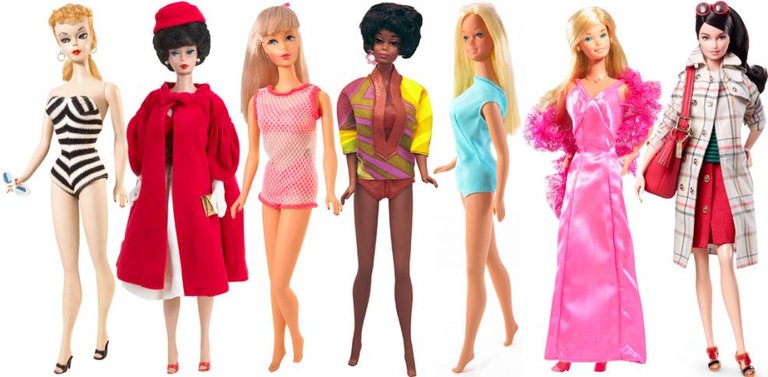
It is a 29 cm doll marketed since 1959 by Mattel, an American company of toys and games. She returned to adult form, blond hair and the principle of Bild Lilli, the first model doll launched in Germany earlier.
In 1997, Mattel sold his billionth Barbie doll. In 2009, and despite a sharp drop in sales due to competition, the doll generated more than one billion euros in sales.
If the characteristic Barbie is blonde with long hair and European features, her hair color varies in fact considerably and her ethnic type has diversified since 1967 and more systematically from 1980, so that to this day there is a Barbie for just about every ethnic group in the world.
She has multiple trades and professions such as: doctor, teacher, jockey, veterinarian, stewardess, Knight of the King, First Lady, ...
At the end of 2015, a little boy appears for the first time in one of the advertisements of the brand deserving the qualities of the Barbie dressed by the Italian fashion company Moschino. This advertising that created the event worldwide, is then critically acclaimed, while Barbie Moschino, it quickly becomes out of stock.
In 2016, faced with the acceleration of the fall in sales of Barbie, Mattel goes much further in its diversification approach by launching three new silhouettes of Barbie alongside the traditional Barbie; one of these new silhouettes, called Curvy, offers a plump Barbie, almost plump, quite far from the original Barbie.
History

Mattel is an American toy and gaming company founded in 1945 by Harold Matson and Elliot Handler, hence the name of the company: Mat + Ell = Mattel. It was Elliot Handler's wife, Ruth Handler, who created Barbie (diminutive of their daughter Barbara) in 1959, taking on the characteristics of Bild Lilli, a German doll with an adult body, blond hair and a guardian contemporary dress, prototype of the doll model.
The first Barbie doll was presented at the American International Toy Fair in New York on March 9, 1959 by her designer Ruth Handler. The almost immediate success of this new kind of doll pushed her husband and a partner to create Mattel Creations. The Barbie doll with its opulent chest, its slender waist and long legs were, in fact, totally against the round and asexual style dolls of the time. In this, she was the second adult body doll after the Bild Lilli.
On a family trip to Lucerne, Switzerland, in 1956, Barbara, Elliot's daughter and Ruth Handler, asked her parents for an unusual toy for the time: a model doll named Lilli. This teasing, busty toy intrigued Ruth Handler, but it was only by watching her daughter play for hours with the Lilli doll that Mattel's director decided to produce the same toy in the United States.
For example, the Handler family brought Lilli back to her suitcases on the American continent, and three years later Mattel launched her new toy, the Barbie doll, which, with the exception of a few make-up changes, was the perfect replica of the Lilli doll. Barbie's success spread throughout the United States like a trail of powder, and soon Mattel's new doll invaded European toy stores.
In 1963, Rolf Hausser, director of the toy company O & M Hausser and creator of Lilli, discovered with surprise his doll in a shop window of toys in Nuremberg the perfect copy of his Lilli renamed Barbie. Rolf, at first decided to sue the giant Mattel in court, but reasoned by his brother and given the limited financial resources of the small German company, the lawsuits were dropped.
In 1964, Rolf Hausser sold the rights of the Lilli doll to Mattel to save the family business that went bankrupt a few years later.
Barbie is the diminutive of Barbara, the first name of Ruth Handler's daughter. His measurements, initially hypertrophied, are reduced to more usual proportions over the years.
1960s
Barbie Ponytail
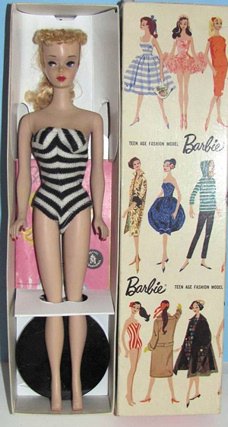
Initially, from 1959 to 1960, Barbie doll 1 / 6th scale, is dressed only in black and white: her hair is platinum blonde or brown, the apple of her eyes is white and she wears a zebra jersey, white sunglasses, black shoes and earrings.
The reason is that Barbie's advertising mobilizes a new medium at the time: television. It must be at its best on the small screen that does not broadcast in color yet. In addition, his eyes are slightly directed down and to the right.
As the doll then gently bends her head, it gives the teasing and falsely submissive look of the women of the time. She already has a wardrobe sold separately and a Barbie label is sewn on each garment. This shocked America feminists and leagues of virtue. In 1961, the German Bild Lilli stops being sold in the face of the success of Barbie.
The same year, a red version of the Barbie doll is marketed and from 1962, she wears a red swimsuit. In 1963, Barbie arrived on the toy shelves in France. From 1964, Barbie can bend her knees, her eyes close, she has a little sister, Skipper.
Barbie Bubble Cut
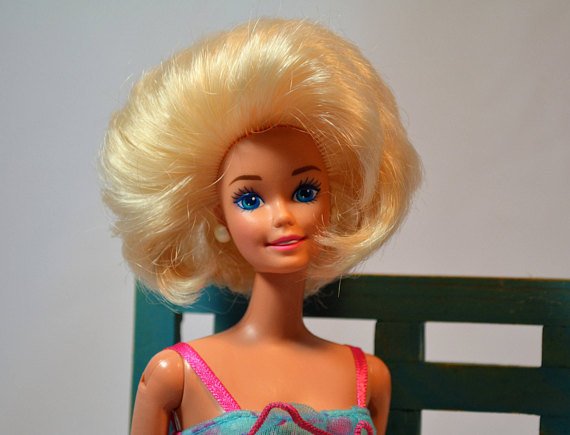
This model is marketed from 1961 to 1967 and takes its name from its short, ball-shaped haircut. The swimsuits are identical to those of the Ponytail and her hair is brown, blond or red.
Barbie Fashion Queen
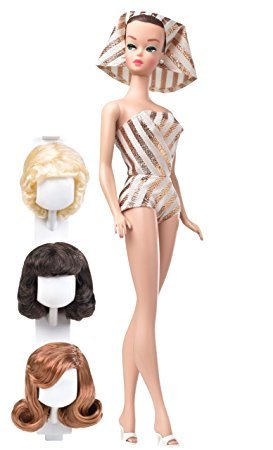
This model, marketed from 1963 to 1967, has the distinction of having the hair molded to be able to put the three wigs sold with the doll.
Barbie Swirl

This doll, produced from 1964, has blond, brown or red hair, wearing a ponytail with a wick over the forehead that leaves on the right side of the head. His original outfit is a black or red swimsuit.
Barbie American Girl
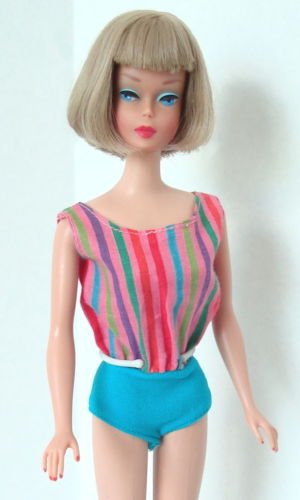
The Barbie American Girl is a very vintage doll dressed in flashy colors always looking at an angle, it's the second Barbie to have foldable legs. Marketed in 1965, it still evolves until 1966. The first American Girl are blond, brown or red, with a cut and squares bangs. In 1966, Mattel released the model American girl side part by adding a line on the side.
Barbie Twist'n turn

In 1967 the Barbie Twist & Turn is marketed: Thinner, less makeup, long and straight hair, she is the one that will really bring Barbie into the world of fashion.
1970s
Just before the 1970s, Barbie's face changed, he lengthened; she speaks English, and in 1968, her black friend, Christie, appears. She is now wearing a miniskirt.
It was in 1971 that Malibu Barbie, a head girl with an impeccable tan, finally looked straight ahead. The reason is that now Barbie drives her own car and it is no longer possible, in doing so, that she looks at an angle. From that moment, Barbie will see her professions, hobbies and professions multiply in an increasingly explicit perspective of diversifying the role of women. In 1985, an active woman, Barbie wears a pink suit and a briefcase, she practices a great many sports.
If, since 1980, the ethnic type of Barbie has thus greatly diversified, it is not so much of its original companion: Ken (the name of the son of Ruth Handler) who, him, little changed over the years . In 2005, Barbie broke his affair with Ken for Blaine, an Australian surfer; but, Mattel relaunches Ken in February 2006 against the indifference of the young buyers for Blaine.
1980s

In the 1980s, Barbie is more famous than ever. In 1981, Barbie became President of the Republic. But she also works in office-related occupations, which also reminds women that women have more and more access to the world of work.
Besides, each Barbie advertisement is signed with the replica "We, Girls, can do anything. Right, Barbie? Which shows that girls can have as much access to trades as men. She is also a rock singer, because it is in the 1980s that many singers and groups are at their peak (Madonna, Diana Ross, Chic group, Bangles ...). Finally, it is at this time that the series Barbie holidays is born. This is a collector series.
Indeed, at Christmas every year, since 1986, a Barbie Holidays is sold. That year, the first Barbie Blue Rhapsody Barbie porcelain, begins the collection. Barbies representing the whole world are also marketed: Japanese Barbie, Indian Barbie, Hispanic Barbie, German Barbie, Irish Barbie ... In 1981, in honor of the wedding of Prince Charles and Lady Diana Spencer Come out Barbie Ken and Barbie Charles and Diana.
1990s
In the 1990s, Barbie is represented with a longer hair as evidenced by Barbie totally hair (1992), Barbie Glitter Hair (1994) and Barbie Cut n 'Style (1994)
Years 2010
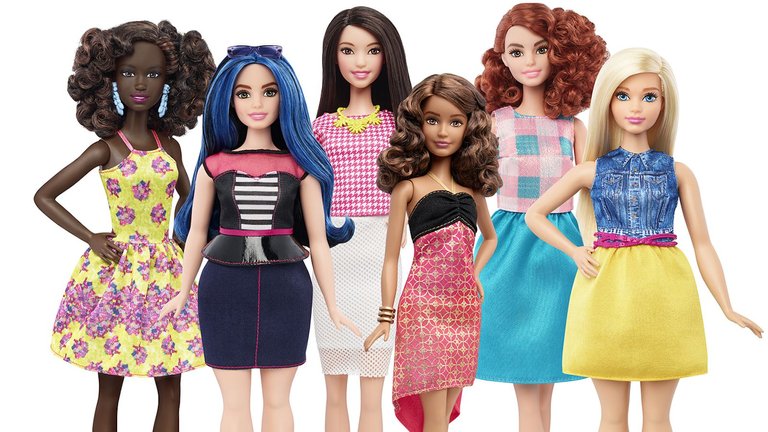
In 2016, the traditional Barbie with long legs, large breasts and ultra-thin waist is competing with three new Barbie: "Tall" (large and long), "Petite" (all petite), and "Curvy" ("Very fleshy", with less chest, but a small round belly, wider hips, buttocks and rounded thighs).
Kim Kardashian, an inspiration for the new Barbie "Curvy".
These developments, which are in fact a revolution in the marketing approach of the brand to the point that Barbie "Curvy" is the cover of Time Magazine, result of a questioning made essential by the loss of market share of Barbie dolls , further accentuated by the loss of the Disney license to market the Elsa doll taken from The Frozen.
This loss represents for Mattel a loss of turnover valued at $ 500 million. However, this abandonment of the traditional silhouette of Barbie presents interesting development possibilities, insofar as it will lead to an accelerated renewal of the wardrobe: Barbie "Curvy" can not indeed put on the clothes of the traditional Barbie.
The brand's new approach aims to get closer to the reality of the American female population by abandoning some of the stereotypes conveyed by Barbie, in favor of new beauty canons popularized by such personalities as Mariah Carey, Kim Kardashian, Beyoncé, Christina Hendricks, Meghan Trainor, even Melissa McCarthy and her "plus size" clothing line.
Developed in secrecy under the code name of Project Dawn, this radical shift is not without risk: regular clients may feel betrayed, and mothers of little girls who are offered a Barbie "Curvy" can see a veiled criticism of the stoutness of their offspring.
Moreover, this change in strategy will be a logistical nightmare to manage these new variants in practice, not to mention the problems that had to be solved to translate the three new names into dozens of different languages.
In the face of falling sales, however, Mattel had no choice. And the hardships to cope only reflect Barbie's American icon status for many years, as 92% of American women owned a Barbie between the ages of 3 and 12. Still, according to Le Journal de Montréal, which publishes the images of these new Barbie Fashionistas, "the new Barbie" Curvy "could change the way women see themselves."
Hello,
Copying/Pasting full texts without adding anything original is frowned upon by the community.
These are some tips on how to share content and add value:
Repeated copy/paste posts could be considered spam. Spam is discouraged by the community, and may result in action from the cheetah bot.
If you are actually the original author, please do reply to let us know!
Thank You!
More Info: Abuse Guide - 2017.
I'm not a great connoisseur of Barbie's toys. I'm even happy about this :)
But this is definitely a very popular doll in the whole world. I think that very many people have heard of it.
A successful combination of circumstances and good work made this doll very popular. And popularity has a direct relationship to money. Therefore, this doll was not only popular but also very sold. So it brought a lot of money.
I liked the article, thank you
I never knew that these dolls were so old, thanks for the information!
Hello, what beautiful memories this post brought me. I had the barbies in almost all the trades, I loved playing with them.
love barbies
it's sad that some women have a barbie pattern ....
it,s really beautifull doll.....

thanks for sharing......
Cantik
well post in doll... thanks for information...
Over the years, Barbie generated huge sales–and a lot of controversy. On the positive side, many women saw Barbie as providing an alternative to traditional 1950s gender roles. She has had a series of different jobs, from airline stewardess, doctor, pilot and astronaut to Olympic athlete and even U.S. presidential candidate. Others thought Barbie’s never-ending supply of designer outfits, cars and “Dream Houses” encouraged kids to be materialistic. It was Barbie’s appearance that caused the most controversy, however. Her tiny waist and enormous breasts–it was estimated that if she were a real woman, her measurements would be 36-18-38–led many to claim that Barbie provided little girls with an unrealistic and harmful example and fostered negative body image.
Despite the criticism, sales of Barbie-related merchandise continued to soar, topping 1 billion dollars annually by 1993. Since 1959, more than 800 million dolls in the Barbie family have been sold around the world and Barbie is now a bona fide global icon.
thank you so much for share with us

just
hi,@lndesta120282
very lovely post with barbie doll and it was very fashionable.....
barbie was one of the first toys to have a marketing strategy based extensively on television advertising, which has been copied widely by other toys.
thanks for nice post.....
Doll barby fashon good
Let`s hope my little girl wont play with Barbies.
Right now it looks good. If she listen to guitars she starts yelling very deep banging her head. ^^
As time pass even the toy evolve its apperance.
wow, what a lovely post .I love it.
I doubt that in the 80s a line of Madonna themed Barbie were released given that the "music" outfit that Barbie was wearing did not exist until 2000
Every baby girl's friend...